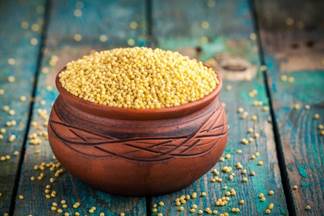Description

Disclaimer: Copyright infringement not intended.
Context
- The Union Agriculture and Farmers Welfare Minister Shri Narendra Singh Tomar have said the International Year of Millets (IYOM) – 2023 will provide an opportunity to increase global production, efficient processing and better use of crop rotation and promote millets as a major component of the food basket.
Must Read Articles:
https://www.iasgyan.in/daily-current-affairs/millet
https://www.iasgyan.in/daily-current-affairs/millets-6

Key pointers
- On the initiative of India, the United Nations has declared the year 2023 as the International Year of Millet (IYOM).
- Under the National Food Security Mission (NFMS), a nutritious cereal component for Millet is being implemented in 212 districts of 14 States. Apart from this, many types of assistance are given to the farmers by the states.
- The time has come for the Public Distribution System to shift the focus of distribution programs from basic calories to provide a more diverse food basket that includes millets to improve the nutritional status of preschool children and women of reproductive age.
- Government of India had notified millet as a nutritious -cereal in April 2018 and millet has also been included in the Poshan Mission campaign.
- Funding is also being done by the Ministry of Agriculture for supporting sustainable production, creating awareness for higher consumption, developing market and value chain and research-development activities.
- Government is providing support to Start-up entrepreneurs for recipes and value-added products to promote the consumption of millet.
- India has more than 500 startups working in the millet value-added chain, while the Indian Institute of Millets Research has incubated 250 startups under RKVY-Raftar.
- NITI Aayog and the World Food Program intend to identify and solve the challenges in a systematic and effective manner. The partnership will focus on mainstreaming millets and support India in taking the lead globally in knowledge exchange using the opportunities in the form of the International Year of Millets.
- Millets are important for food security as well as international relations. Millet is a storehouse of micronutrients, vitamins and minerals. International Year of Millets will raise awareness about the contribution of millets to Food Security and Nutrition, motivate stakeholders for continuous production and quality improvement of millets and attract attention to increase investment in research and development services.
- Asia and Africa are the major production and consumption centres of millet crops. India, Niger, Sudan and Nigeria are the major producer of millet.
- Millets provide an alternative food system in times of increasing demand for vegetarian foods. Millets contribute to a balanced diet as well as a safe environment. These are the gifts of nature to mankind.
- Jowar and Proso Millets (Common Millet) are the most cultivated millets in the 112 and 35 countries respectively. Sorghum and pearl millet cover more than 90% area and production. The remaining production comes from Ragi (Finger Millets), Cheena (Proso Millets), Foxtail Millets (Kangni) and other non-segregated millets.
- India is the major production country of Millet in which Kangni, Kutki or small millet, Kodon, Gangora or Barnyard, china and Brown top are included with Jowar, Bajra, Ragi and small millets. Most of the states in India grow one or more millet crop species. During the last 5 years, our country produced more than 13.71 to 18 million tonnes of millet with the highest production in 2020-21.
- According to the fourth advance estimate for the year 2021-22, about 16 million tonnes of millets have been produced in India, which is about 5 percent of the national food grain basket.

https://indiapressrelease.com/pib-press-releases/international-year-of-millets-iyom-2023-will-provide-an-opportunity-to-globally-promote-millets-as-the-nutritious-cereals-shri-narendra-singh-tomar/












